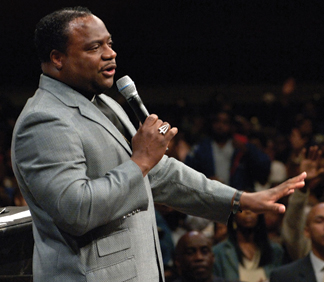World
June 17, 2011
http://www.worldmag.com/articles/18228
 |
Eight months ago, New Birth Missionary Baptist Church of Lithonia, Ga., was one of the largest and most dynamic megachurches in the nation. The church and its multiple ministries provided the local poor with food, shelter, transportation, and financial assistance. It delivered munificence and missionaries around the world. In 2010 alone, the church claims that its worldwide mission support reached 172 countries. And the church was most renowned for its unique and charismatic pastor, Bishop Eddie Long, who wrote best-selling books on everything from relationships and biblical manhood to sanctification and self-help. His television program on the Trinity Broadcast Network was said to reach 270 million people worldwide.
Yes, many called him a peddler of the prosperity gospel, a false shepherd seeking only to fleece the flock. Yes, it took some explaining why Long wore muscle-shirts in the pulpit, or outfits that looked like Star Trek uniforms, as well as why he drove a Bentley and lived in a mansion on 20 acres of land. Eyebrows were raised when Long received, as the Atlanta Journal-Constitution reported, millions of dollars in salary in 1997-2000 from the nonprofits under the umbrella of the church. And Long hardly sounded humble when he told a pesky AJC reporter, "I'm not going to apologize for anything. We are not just a church, we're an international corporation. . . . I deal with the White House. I deal with Tony Blair. I deal with presidents around this world. I pastor a multimillion-dollar congregation."
Yet none of these things substantially harmed church attendance. What finally slowed down the New Birth dynamo were allegations, first aired in September 2010, that Bishop Long took young men on his various travels and sought to coerce them into sexual acts. The four young plaintiffs claimed that Long bought them cars, paid them salaries, and flew them around the world, explaining how the Bible justified their activities. Since Long was known for his vigorous opposition to gay marriage, the charges of hypocrisy came swift and strong. Long told his congregation days later, "I am not a perfect man, but this thing, I'm going to fight."
The public allegations came to an end on May 27 as Long settled the cases out of court. Although the terms of the settlement were not disclosed, one term was clear: Neither the young men nor their attorney could ever talk about the lawsuits again. There was no confession of guilt, and Long's spokesman explained that Long settled merely in order to "bring closure" and "move forward with the plans God has for this ministry."
Damage, however, is already done. New Birth's attendance has fallen steeply, its vast parking lot only half-filled on Sundays. The church laid off staff members and cut Long's salary. The settlement stunned many in the congregation. As Shayne Lee, a sociologist who specializes in televangelists, told CNN, settling outside of court implies some measure of guilt. Against such serious charges, "You can't settle outside of court. You have to . . . roll up your sleeves, be defiant and fight it."
We may never know for certain whether Eddie Long was guilty of these charges. Yet the perception of guilt will remain, in part because Long stands in the tradition of prosperity gospel televangelists who grew massive ministries, lavishly indulged themselves, and began to think they could justify anything to their followers. The same qualities that make for successful pastors or politicians—personal magnetism, powers of empathy, and ego—can lead them into temptation and scandals, often with initially small steps.
Of the world
Observers, victims, and church authorities have argued for years whether the Roman Catholic clergy abuse crisis grew out of pervasive homosexuality in the priesthood, the vow of chastity, or an insular and oppressive environment within the Catholic Church. The correct answer, claims a new report, is none of the above.
The U.S. Conference of Catholic Bishops hired the John Jay College of Criminal Justice to conduct an independent inquiry into the abuse crisis. The first report from the John Jay team, in 2004, detailed the frequency of abuse, the characteristics of abusive priests, and the history of responses from 1950 through 2002.
The second report, now public, finds no single cause of priests' sexual abuse of children. The investigators did not find a significant link between abuse and pedophilia (fewer than 5 percent of alleged abusers fantasized about prepubescent children, and most also had sexual relations with adults), abuse and homosexuality (gay priests were becoming more common, they say, as the incidence of abuse was dropping, though Christians may wonder whether the research team was ever willing to implicate homosexuality in the first place), or abuse and chastity (the vow of chastity has remained constant even as abuse rates have risen and fallen).
What the report does implicate is the social and moral disintegration of the "sexual revolution" in the 1960s and 1970s. Priests, like everyone else, are susceptible to temptation and shaped by their surroundings. When the culture around them promoted experimentation and promiscuity, priests found it easier to disregard their internal inhibitions. The study is critical of Catholic leadership, but it also finds that a slow, uneven, but eventually effective response within the Catholic Church itself led to a steep decline in abuse.
Any original material on these pages is copyright © BishopAccountability.org 2004. Reproduce freely with attribution.